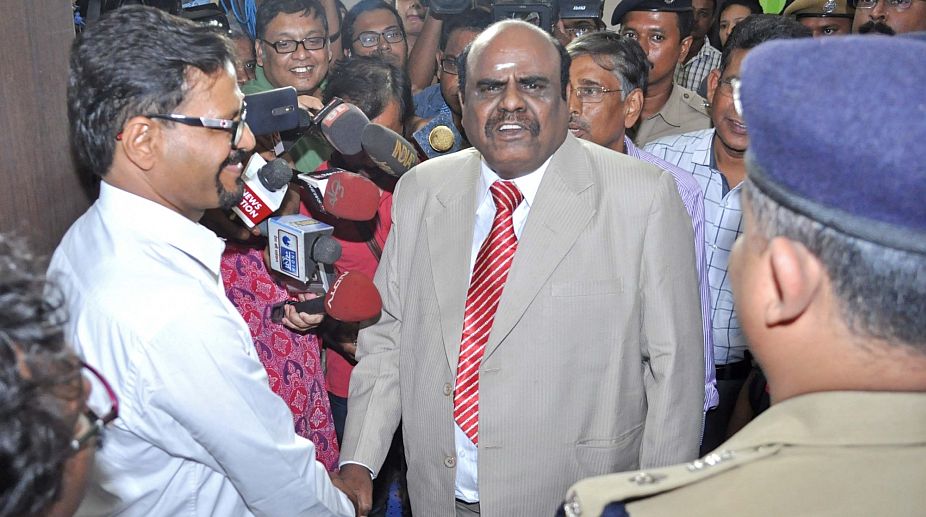The Supreme Court on Wednesday said that the former Calcutta High Court judge Justice C.S. Karnan had committed "grossest and gravest" act of contempt of court, thereby making himself "liable to be punished, for his unsavoury actions and behaviour".
"We have no hesitation in concluding, that the actions of Shri Justice C.S. Karnan constituted the grossest and gravest actions of contempt of court. He has also committed contempt, in the face of the court. He is therefore liable to be punished, for his unsavoury actions and behaviour," said the bench of seven judges headed by Chief Justice Jagdish Singh Khehar in their judgment of May 9 that was only made available on Wednesday.
Advertisement
Besides Chief Justice Khehar, other judges on the bench were Justice Dipak Misra, Justice J.Chelameswar, Justice Ranjan Gogpoi, Justice Madan B. Lokur, Justice Pinaki Chandra Ghose and Justice Kurian Joseph.
While the judgment holding Justice Karnan guilty of contempt and sentencing him to six months in jail is unanimous, Justice Chelameswar and Justice Gogoi gave concurring judgment with their separate reasoning.
Soon after the verdict was pronounced, Karnan left for Kolkata for Chennai. He was arrested from Coimbatore by West Bengal police on June 20, a few days after he retired from service.
Speaking for the bench, Chief Justice Khehar said: "His interviews with the media, and the orders passed by him were extremely disparaging …"
The judgment cited the instance of April 14 when Justice Karnan ordered the registration of a case under the provisions of the Scheduled Castes and Scheduled Tribes (Prevention of Atrocities) Act, 1989, against all the seven members of the apex court bench.
It also referred to his April 28 order of Justice Karnan by which he had directed the Air Control Authority, New Delhi, not to allow any of the seven apex court judges to travel abroad.
The judgment also referred to May 7 order of Justice Karnan by which he sentenced "all the 7 members of the Bench, and Mrs. Justice "R.B. …" to 5 years rigorous imprisonment".
Justice Chelameswar and Justice Gogoi, in their concurring judgment, said: "The conduct of the contemnor during the pendency of the proceedings in this Court certainly constitutes criminal contempt falling both under the heads of scandalising the court as well as interference with the proceedings of this court."
Justice Chelameswar, who wrote the concurring judgment said, "This case, in our opinion, has importance extending beyond the immediate problem" that involved the selection and appointment of judges and to put in place a legal regime to deal with situation "where the conduct of a Judge of a constitutional court requires corrective measures – other than impeachment – to be taken".
Pointing out that the conduct of Justice Karnan "ever since his elevation to the bench has been controversial", he said, "Our purpose is not to point fingers to individuals who were responsible for recommendation but only to highlight the system's failure of not providing an appropriate procedure for making such an assessment.
"What appropriate mechanism would be suitable for assessing the personality of the candidate who is being considered for appointment to be a member of a constitutional court is a matter which is to be identified after an appropriate debate by all the concerned – the Bar, the Bench, the State and Civil Society. But the need appears to be unquestionable."
"We are only sad to point out that apart from the embarrassment that this entire episode has caused to the Indian Judiciary, there are various other instances (mercifully which are less known to the public) of conduct of some of the members of the judiciary which certainly would cause some embarrassment to the system," it added.











